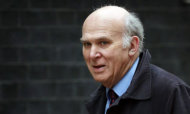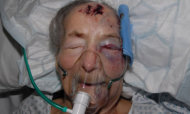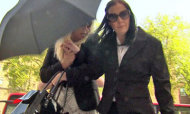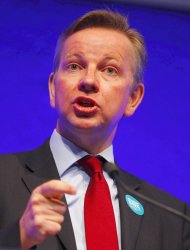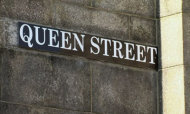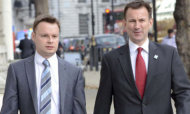Politics and history have helped shape a different relationship between Scotland and the monarchy than exists south of the border - creating a mixed mood for the Queen's Diamond Jubilee.
It is often said that republican sentiment and geographical distance disconnect Scots from the Monarch so often described as the "Queen of England".
A recent YouGov survey found that more Scots took national pride from comedian Billy Connolly than from the Queen.
Only 41% said the Queen made them proud to be Scottish while a total of 58% took national pride from Billy Connolly.
South of the border, 80% of people questioned said the Queen made them feel proud to be English.
To gauge a Scottish view of the Queen Elizabeth II, and all things Diamond Jubilee, I took a walk down, where else, Queen Street - one in Aberdeen, the other in Edinburgh.
Here's who I met, and here's what they told me.
Councillor George Adam, Lord Provost of Aberdeen, who has his office in the council buildings on Queen Street:
"My view is that it's a tremendous opportunity for a bit of fun and a bit of entertainment, as well as recognising the fabulous service that the Queen has given to our country.
"It is an opportunity for the people across the UK, across the world, and in Aberdeen to celebrate that occasion.
"With the Royal connections in this area, there is just a love of the Queen in this area.
"So people are very supportive and I think they look at the tremendous service she's given the country and they see that it's something worth celebrating.
"If you've been in a job that long, it's worth throwing a party."
Alison Blair, Aberdeen tax specialist:
"I'm not a supporter of the Royal Family, I'm afraid, so it doesn't interest me. I couldn't tell you what day it is or anything about it and I don't think a lot of people in Scotland are.
"I think there's a lot of disinterest in the Royal Family, particularly in Scotland, because they're so far away.
"It doesn't with meet peoples' realistic ideas and goals and, especially with the recession and everything, I think it's the last thing on people's minds - they've got more to worry about."
Gordon McKay is the owner of McKay's outdoor wear shop, which has had a presence on Aberdeen's Queen Street for more than a century.
His shop front is decorated with Union flags and he fondly remembers the day of the Queen's coronation in 1953: "Being at school, at that age, you got very excited about things and it brought a bit of colour into what was a very drab Britain at that particular time.
"It gave the whole country quite a lift. I recall that we all got a small blue Bible and a tin of chocolates which in itself, for a child, was a good thing.
"After that we went to the local cinema to see it on the screen, which was magnificent as well, to see all the colour and pageantry at that particular time."
Newton Faulkner, musician, is a native of Kent. I found him sound-checking for a gig later that night in the Lemon Tree venue on Aberdeen's Queen Street:
"I'm not unsupportive, it's just not something I think about very often. I know that sounds bad, it's probably a generational thing.
"It's definitely not a bad thing and it's obviously a huge part of our heritage but, beyond that, it doesn't take up a huge amount of brain space for me."
Jim Fairgrieve, a cobbler on Queen Street, Edinburgh: "I'm a supporter of the Queen but not so much the other people involved, the hangers-on.
"She brings revenue into the country but they cost the country money. She's the Queen not only of this country but also of Australia and places like that and she's got a good reputation.
"She's achieved a lot and she's been good for the country."
Susan Mitchell, a shopper on Queen Street, Edinburgh: "I've absolutely nothing against the Queen and I appreciate that she works hard for the country. However, I don't have any interest in the celebrations.
"In fact, I couldn't even tell you when it is. I hope everyone planning to take part has a good day, though, and enjoys the occasion - the Queen and her family included!"
Comedian Des Clarke, performing at The Stand comedy club, just off Edinburgh's Queen Street: "The Queen? I think most people, generally, quite like the Queen. She gets to go out in public and wave jewellery - she is, sort of, like Britain's Mr T.
"She's done it for quite a long time and I think that anyone, in this current economic climate, who can stay in a job for 60 years - she must be doing well for herself.
"The relationship between Scotland and the Queen is quite interesting.
"Will we be having lots of street parties? No. Are we glad we're getting a couple of days off work? Yes.
"So I think anybody who can get us time off and have an extra couple of days drinking is always going to go down well in Scotland."
©SkyNews 2012

